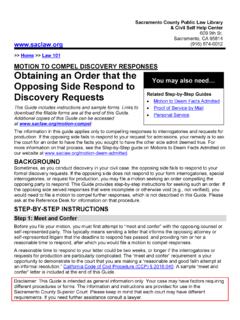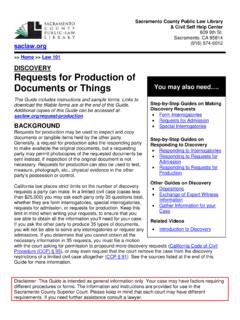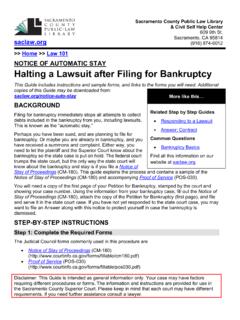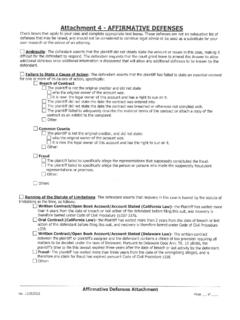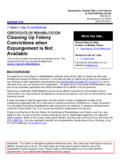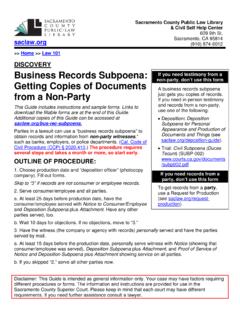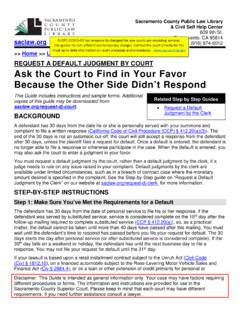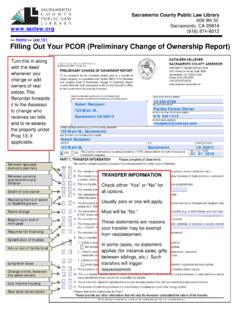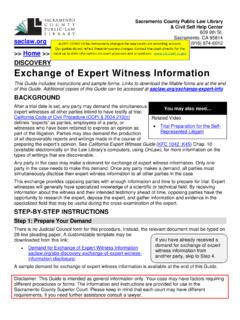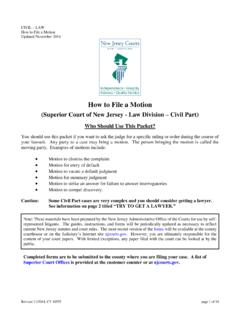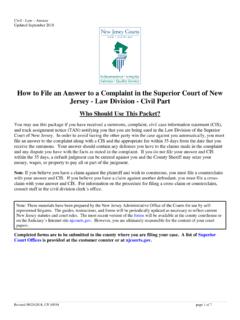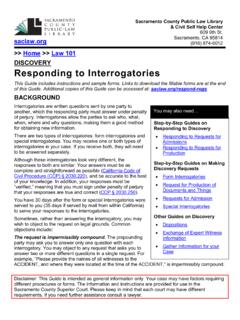Transcription of Form Interrogatories
1 >> Home >> Law 101 Disclaimer: This guide is intended as general information only. Your case may have factors requiring different procedures or forms. The information and instructions are provided for use in the Sacramento County Superior Court. Please keep in mind that each court may have different requirements. If you need further assistance consult a lawyer. Sacramento County Public Law Library & Civil Self Help Center 609 9th St. Sacramento, CA 95814 (916) 874-6012 discovery Form Interrogatories This guide includes instructions and sample forms. Links to download the fillable forms are at the end of this guide .
2 Additional copies of this guide can be accessed at: BACKGROUND Interrogatories are written questions sent by one party to another, which the responding party must answer under penalty of perjury. Interrogatories allow the parties to ask who, what, when, where and why questions, making them a good method for obtaining new information in a case. There are two types of Interrogatories : form Interrogatories and special Interrogatories . This guide will discuss form Interrogatories ; for more information on special Interrogatories , see the Step-by-Step guide on Special Interrogatories on our website at Form Interrogatories are an easy way for parties to ask common questions by simply checking the boxes for the questions they wish to ask.
3 In a limited civil case (cases less than $25,000) you may ask each party only 35 questions total, whether they are form Interrogatories , special Interrogatories , requests for admission, or requests for production of documents. Keep this limit in mind when writing your requests, to ensure that you are able to obtain all the information you ll need for your case. If you ask the other party to answer 35 Interrogatories , you will not be able to request any admissions or request any documents. Step-by-Step Guides on Responding to discovery Responding to Interrogatories Responding to Requests for Admissions Responding to Requests for Production Step-by-Step Guides on Making discovery Requests Request for Production of Documents and Things Requests for Admission Special Interrogatories Other Guides on discovery Depositions Exchange of Expert Witness Information Gather Information for your Case Related Videos Introduction to discovery You may also Form Interrogatories >>Home >>Law 101 2 STEP-BY-STEP INSTRUCTIONS Step 1.
4 Select the Proper Form(s) Form Interrogatories have been created for use in both limited and unlimited cases. Subparts are prohibited in Interrogatories in limited cases, to ensure that only 35 questions total are asked. For this reason, a form was created specifically for limited civil cases: Form Interrogatories - Limited Civil Cases (DISC-004). If you have a limited case, you must use this form. In an Unlimited Civil Case (over $25,000), parties may ask an unlimited number of form Interrogatories . These questions may include subparts as appropriate. Several forms have been created for the most common questions in a variety of case types: Form Interrogatories - General (DISC-001) Form Interrogatories - Employment Law (DISC-002) Form Interrogatories - Unlawful Detainer (DISC-003) Form Interrogatories - Construction Litigation (DISC-005) You may use any of these forms to ask Interrogatories in an unlimited case.
5 Most of the questions included in form Interrogatories are fairly easy to understand, if you read them carefully. Step 2: Complete the Form(s) In this guide , we will explain the questions included in the general forms (Form Interrogatories - General (DISC-001) and Form Interrogatories - Limited Civil Cases (DISC-004)), which mirror each other. Instructions for completing the top caption of the form are contained in the sample pages included at the end of this guide . Check the box for each question you wish the other party to answer. Read each question carefully, and consider whether the information you will obtain is relevant to the issues in the case.
6 The other party may object to any request you make that does not lead the discovery of relevant, admissible evidence. The following table provides an explanation of the questions on Form Interrogatories - General (DISC-001) and Form Interrogatories - Limited Civil Cases (DISC-004). Sections 1-3 Instructions for the parties for asking and answering form Interrogatories . Be sure to read these instructions carefully. Section 4 Read these definitions carefully, so you understand how the terms will be used throughout your requests. For the term INCIDENT, you may use either the preprinted definition by checking the box at the bottom of the first page, or you may write your own.
7 If you write your own, check instead the box in the upper right of the second page, and write the definition in the space below it. Limit your definition to a single action, event or moment in time, as many of the Interrogatories require INCIDENT to be defined in such a way that INCIDENT refers to a single event that can be said to have occurred at Form Interrogatories >>Home >>Law 101 3 a single moment in time. If you need more space, use an additional page and label it Attachment 4(a)(2). Section 5 The Form Interrogatories in Form Interrogatories - General (DISC-001) and Form Interrogatories - Limited Civil Cases (DISC-004) are broken into sections that correspond to each other.
8 These sections are identified with a bold heading prefaced by a number with a decimal 0, such as , followed by Interrogatories with decimals starting at .1, such as , , etc. The headings are not Interrogatories ; they merely identify the type of questions in the section. Section number on DISC-004 (Limited cases) Section number on DISC-001 (Unlimited cases) 102 2 Questions to obtain general background information about an individual. 103 3 Questions to obtain general background information about a business entity. 104 4 Questions about insurance coverage that may cover the incident.
9 This question may be asked by either party, but is more commonly asked by the plaintiff. 106 6 Questions to obtain additional information about physical injuries claimed in the complaint. Usually asked by the defendant. 107 7 Questions to obtain additional information about property damage claimed in the complaint. Usually asked by the defendant. 108 8 Questions to obtain additional information about lost wages or earning capacity claimed in complaint. Usually asked by the defendant. 109 9 Catch-all questions to obtain additional information about other damages claimed in the complaint.
10 Usually asked by the defendant. Form Interrogatories >>Home >>Law 101 4 110 10 Questions to obtain medical information. Used by the defendant to determine if the plaintiff had any preexisting conditions, etc., that may have caused the injuries described in complaint. Used by the plaintiff to determine if the defendant had any medical or physical conditions that may have caused the accident/incident to take place. 111 11 Questions asked by the defendant, to determine if the plaintiff previously filed a lawsuit against another party for these injuries, or if the plaintiff is a serial litigant.
